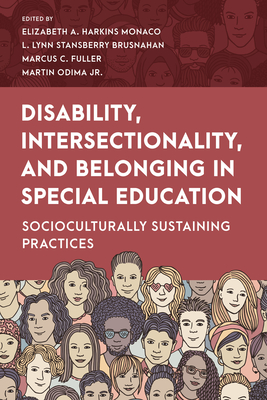Disability, Intersectionality, and Belonging in Special Education: Socioculturally Sustaining Practices

Disability, Intersectionality, and Belonging in Special Education: Socioculturally Sustaining Practices
This book focuses on preparing culturally competent educators who use culturally sustaining practices and culturally relevant curricula and instruction through an intersectional lens.
This book will assist pre-service students and special education practitioners and administrators to meet all the needs of disabled individuals. Understanding the full-range of needs relating to sociocultural sustaining practices is imperative to working with individuals with disabilities and their families and care-givers. Being able to understand and explain this complex issue to others is important and often very necessary.
One recent contributor to social injustices is the COVID-19 pandemic and there are continued issues around police brutality for people of color. Social injustices in special education are historical and systemic. Special education practitioners are typically unaware of the importance of intersectional differences because they have only been prepared to address cultural perspectives during awareness days or through specific units in curricula. Other times they discuss it diagnostically, such as part of an educational plan or to learn English as a second language.
Other issues stem from the value system of the special education practitioners themselves; some are not willing to engage in these concepts, while others prioritize treating all students the same by using the terms fairness, equity, and colorblindness to justify this. Even when special educator practitioners attempt to address injustices on behalf of their students, they tend to center only on the student's disability which means they are ignoring or erasing other aspects of their students' identities.
These issues highlight the importance of building the cultural competence of our teaching force. This book will help practitioners build this competence in their own spheres of influence.
PRP: 362.70 Lei
Acesta este Prețul Recomandat de Producător. Prețul de vânzare al produsului este afișat mai jos.
326.43Lei
326.43Lei
362.70 LeiLivrare in 2-4 saptamani
Descrierea produsului
This book focuses on preparing culturally competent educators who use culturally sustaining practices and culturally relevant curricula and instruction through an intersectional lens.
This book will assist pre-service students and special education practitioners and administrators to meet all the needs of disabled individuals. Understanding the full-range of needs relating to sociocultural sustaining practices is imperative to working with individuals with disabilities and their families and care-givers. Being able to understand and explain this complex issue to others is important and often very necessary.
One recent contributor to social injustices is the COVID-19 pandemic and there are continued issues around police brutality for people of color. Social injustices in special education are historical and systemic. Special education practitioners are typically unaware of the importance of intersectional differences because they have only been prepared to address cultural perspectives during awareness days or through specific units in curricula. Other times they discuss it diagnostically, such as part of an educational plan or to learn English as a second language.
Other issues stem from the value system of the special education practitioners themselves; some are not willing to engage in these concepts, while others prioritize treating all students the same by using the terms fairness, equity, and colorblindness to justify this. Even when special educator practitioners attempt to address injustices on behalf of their students, they tend to center only on the student's disability which means they are ignoring or erasing other aspects of their students' identities.
These issues highlight the importance of building the cultural competence of our teaching force. This book will help practitioners build this competence in their own spheres of influence.
Detaliile produsului










